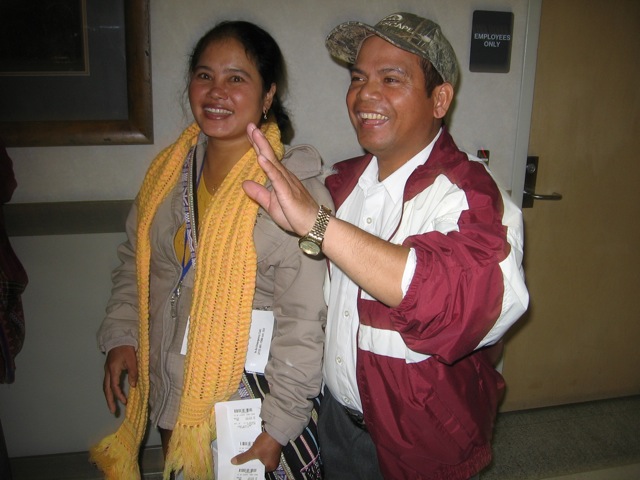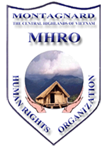
MHRO’S FAMILY REUNIFICATION AND IMMIGRATION SERVICES
Significance
The significance of the Montagnard Human Rights Organization/MHRO’s Family Reunification Initiative is that over a decade it has faced and met an unprecedented challenge to promote free emigration in Vietnam, to achieve refugee protection, family unity, family reunification, refugee integration, and empowerment for the Montagnard population in the Central Highlands of Vietnam and the diaspora community of Montagnards. MHRO has broadened its scope of immigrant integration to serve all refugee populations in NC through its advocacy and immigration services.
Those Montagnard refugees who have fled to the U.S. since 1986 deeply miss their families who were left behind. Successful immigrant integration is diminished when families are separated. MHRO stepped forward, understood the dynamics, and responded to the challenge when the need for family reunification was not being met. The Montagnard population in NC is the largest population of the indigenous Central Highlands tribal people outside of Vietnam.
The challenge continues to be faced as the Family Reunification Initiative unites Montagnard families and other refugee populations through policy advocacy, refugee protection, and immigration services that promote and facilitate legal permanent residence, family unity, U.S. citizenship and community integration. MHRO’s mission emphasizes family unity with the philosophy that united immigrant families create vibrant and healthy communities.
MHRO met an urgent need and challenge by solidifying its vision and mission, mobilizing support, seeking and obtaining funding, and taking action through policy advocacy, community outreach, training, empowerment, BIA agency recognition/staff accreditation, and eventually offering the NC refugee community a full range of vital immigration services which lead to successful integration in the community. MHRO recognized the critical need that unless families are united, there cannot be successful integration.
THE NEED
The population of Montagnards prior to 1975 was over two million people. The systematic policies of the Vietnam government to kill thousands of Montagnards after 1975, to block health care, education and development for the Montagnards, and the impact of poverty and disease have further reduced the Montagnard population in Vietnam’s Central Highlands to approximately 800,000 people or less.
Since the inception of the Orderly Departure Program in Vietnam, known as ODP, the Montagnard population has suffered persecution and experienced restricted access to the legal emigration process, obstruction of travel, and profound obstacles for Montagnard beneficiaries to access the legal emigration programs, whether it was the program known as ODP, HO (Humanitarian Operation) HR, (Humanitarian Resettlement) or the family-based immigration process. Montagnard beneficiaries continue to struggle with obtaining the legal documents required for emigration by the U.S. government. Local provincial officials either withhold the necessary documentation or force Montagnards to pay excessive bribes to obtain the needed documents. Often Montagnard women and children are harassed and psychologically or physically tortured because their family members escaped to the U.S. Congressional testimonies document such abuse.
Over 200 Montagnards were resettled in NC in 1986 and another 400 were rescued and airlifted directly from a remote corner of Cambodia to NC. Since this time, hundreds of family members have emigrated to the U.S. where they have created a successful community in NC, Texas, and smaller communities in the countries of Canada and Finland.
In 2001-2004, several hundred Montagnard refugees fled from Vietnam seeking asylum in Cambodia after a brutal crackdown by the Government of Vietnam following peaceful protests by several thousand Montagnards who were demonstrating for religious freedom and land rights. In Cambodia’s Mondolkiri and Ratanakiri Provinces, several hundred Montagnards awaited their fate while U.S. government officials in the U.S. Refugee Bureau and East Asia Pacific Bureau analyzed the prospects for the refugees’ possible repatriation or resettlement to the U.S.
A NC-based advocacy team, including staff from the Montagnard Human Rights Organization, sought and received U.S. Congressional backing and support. The group mobilized and traveled to Phnom Penh, Cambodia and to the remote UNHCR sites in Sen Menorum, Mondolkiri Province and Ratanakiri to assess the situation and to advocate with UNHCR and the U.S. on behalf of Montagnard protection.
The situation was urgent as options were being considered and the Vietnamese Government accelerated its pressure on both Cambodia and the U.S. to return the Montagnards to Vietnam where they would face punishment and retribution. Several trips were made to Washington D.C. by MHRO to advocate with Members of Congress, the White House National Security Council and the State Dept. to urge that the over 900 Montagn
ards in Cambodia be allowed to resettle in the U.S. under the Lautenberg criteria.The pressure intensified from Vietnam with Vietnamese police and buses dispatched from Daklak and Gialai Provinces to the UNHCR sites to urge the Montagnard asylum seekers to return the Montagnards to Vietnam. Despite the efforts to de-rail the resettlement option, the intense advocacy efforts were successful and over 800 Montagnard refugees were resettled in the communities of Raleigh, Greensboro and Charlotte, NC. Other refugees would follow and seek sanctuary in Cambodia, but their resettlement options in the past three years have begun to diminish because of U.S. refugee policy that has changed regarding Montagnards.
MHRO’s RESPONSE
The NC Refugee Resettlement Agencies worked feverishly to assist the Montagnard new arrivals with their family reunification petitions ( I-730s) but they were overwhelmed. MHRO mobilized as an Ethnic Self-Help Organization and wrote a grant proposal to meet the challenge because the NC Refugee Resettlement Agencies, despite heroic efforts, were unable to meet all of the family reunification needs of the wave of Montagnard refugees who arrived in the state. MHRO’s advocacy experience was also unique as policy advocacy is not always a focus of the refugee volags. MHRO, as an ethnic service provider, had Montagnard staff who could translate immigration documents and who, as former refugees themselves, acutely understood the situation in Vietnam.
The MHRO Family Unification Initiative cooperates closely with other NC refugee agencies, the State Refugee Office, the U.S. Embassy/Consulate, and with USCIS/DHS Service Centers in maximizing advocacy, information, and action on behalf of successful family reunifications through the I-730 process, and also, family-based immigration process. As individual refugees have their I-730 petitions and I-130s successfully processed, families are united. Refugees also establish permanent residence and access to citizenship through MHRO immigration services. The MHRO Family Reunification Initiative brings about emotional well-being, family unity, economic self-sufficiency and integration through its immigration advocacy and services. Given other efforts in the community to address Montagnard immigration integration, MHRO is unique in its successful outcomes, its advocacy role on behalf of all refugees, and its vision of empowerment.
MHRO now reaches out and serves all refugee populations including individuals from Burma, Iraq, Columbia, Iran, Thailand, Sri Lanka, Burundi and Congo. MHRO has worked closely with USCRI’s Raleigh office, in receiving many refugee referrals. MHRO has a unique capacity as an ethnic self-help organization to understand the needs of refugees, respond to those needs and to act as an empowering agent. As refugees become permanent residents and U.S. citizens, the entire Family Reunification Initiative exponentially extends its value.
Impact
MHRO’s aim was to rescue Montagnard refugees, to seek funding which would allow MHRO to handle immigration petitions, to impact U.S. government policies with advocacy which would provide refugee protection and to promote free emigration in Vietnam, to seek BIA accreditation in order to maximize effective immigration services and to promote refugee integration to a broad population of refugees, not only Montagnards from Vietnam.
MHRO accomplished this by impacting the U.S. policy that allowed over 800 Montagnards to be resettled in the U.S. and by continuing its Congressional advocacy and State Dept. efforts to promote policies in Cambodia and Vietnam that protect Montagnard asylum seekers. MHRO accomplished part of the mission by the successful resettlement of over 900 Montagnards from 2001 to 2008. MHRO, in response to the crisis in NC, sought and received 3-year funding from the Office of Refugee Resettlement (ORR) to provide services to the Montagnard community, including family reunification services. MHRO received a subsequent 3 year grant in 2008 to continue services and to expand its mission. As a consequence, MHRO also was intentional in its participation in national immigration trainings. MHRO applied to the Board of Immigration Appeals (BIA) for agency recognition and staff accreditation, and we received this status in September, 2008. This has expanded the scope and effectiveness of the Initiative to now serve other refugee populations.
MEASURABLE RESULTS
MHRO, in its early years, operated exclusively as a volunteer effort. After funding from ORR, from Oct. 2003 to Jan. 2009, MHRO has successfully processed 202 I-730 petitions, 455 I-485, 13 I-90, 48 N 400, 28 I-130 and 6 I-129 F applications. The family reunifications include 136 families with 560 children. 48 individuals have applied for citizenship and 38 received citizenship. Each individual represents a successful outcome that is manifested in community integration through employment, civic participation, home ownership, and children in school or college. There are over 8,000 Montagnards living in the communities of Charlotte, Greensboro and Raleigh with a high percentage of families who are employed.
MHRO also took a major leadership role in NC by leading several refugee resettlement agency delegations to Washington, D.C. to advocate with the U.S. Congress, USCIS/DHS and the State Dept. for policies that impact Montagnard emigration and refugee adjudications in Vietnam, the U.S. Service Centers and at UNHCR in Cambodia. This advocacy resulted in a greater awareness by USCIS to take into humanitarian consideration the reasons why many Montagnard petitioners missed the two year filing deadline for I-730 petitions and also why many Montagnard beneficiaries have extreme difficulty in Vietnam obtaining documents. The Nebraska Service Center informed supervisors about the problems Montagnards face, resulted in a higher approval rate on I-730 applications and consideration to accept affidavits to establish relationship. This policy adjustment impacted not only MHRO, but all the NC resettlement agencies.
The Montagnard Family Reunification Initiative has brought about a greater awareness with the State Dept. (PRM) about the problems Montagnards experience in Vietnam and awareness with the U.S. Congress, UNHCR, and USCIS/DHS. The advocacy has resulted in training for U.S. Consulate staff, UNHCR, and USCIS/DHS District staff about the problems with language and translation issues facing Montagnards seeking refugee status and also human rights violations that impact access to free emigration. Refugee resettlement agencies in NC have a new awareness about the importance of policy advocacy as it impacts refugees.
Montagnards in the community have renewed hope when they experience the joy of family reunifications at the airport or in the community when refugee newcomers begin to seek permanent residence or eventually, achieve U.S. citizenship. The MHRO Initiative has not only created quantifiable results, but it has given hope to those remaining in Vietnam, for those still stuck in the lengthy immigration process, and for those refugees who can experience a Refugee Self-Help Organization that has empowered itself and other refugees
Click the below links to find out more:
MHRO serves over 600 refugees with immigration applications in 2010!
